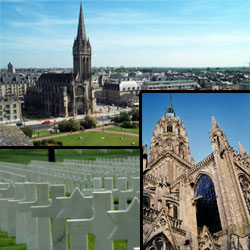
Mark Twain may have written about Innocents Abroad, but when many people write or talk about their times abroad, they often discuss losing their innocence, their sense of naiveté that often accompanies an American citizenship. For example, when I was preparing to go abroad, a good friend of mine, Richard, told me of his own travels in Europe. He spoke of coming home with a new cultural awareness and a vast spiritual awakening — as well as a nasty case of crabs. Innocence lost. Richard advised me to bring to France a journal, to record all of my experiences, and a couple of boxes of Rid.
But I had no innocence to lose. Why this is, well, frankly, I’m not sure I have an answer. Perhaps it was the product of my upbringing in a small, rural town. No one has secrets, and one learns to recognize the petty side of life quickly. Perhaps it was my parents, who always told us the truth and taught us the world is a wonderful and cruel place, who killed my innocence. Maybe it was growing up queer in a world where the hatred of gays is a political platform, or the basis of a tent revival. Maybe it was genetic. Who can say? Excitement, exuberance, awe, these are things I know. But not innocence, never innocence.
So, journal in hand (the Rid I went without, determined it would not be an issue, if you know what I mean), I boarded Canadian Airlines flight 595 from Toronto to Paris. In Paris, I took a train to Caen, a small but historic French city on the Norman coast. I had left Toronto at 9 in the evening, and arrived at the University of Caen at 3 the following afternoon, prepared to spend the next two months studying the French language, culture, and history.
The university was an enormous series of buildings that housed over 36,000 students. As I walked past the large bronze phoenix that stands vigil at the university gates, I could not help but be awed and excited by everything I saw. Thousands of young students milled around the courtyard, talking quietly and smoking. The French smoke as much as some nationalities breathe; as an ardent non-smoker, I found it disgusting, but wisely refrained from saying so, since the French find American attitudes about smoking ridiculous. One Frenchman laughed at me, waving a cigarette in my face, saying, “You Americans are so stupid! You think this is a drug! You think this is bad!” I said nothing. My mother always taught me to be gracious to my hosts. Besides, lung cancer in France has risen over 400% in the last fifteen years; I surmised he would figure it out sooner or later.
After a healthy, one-mile walk uphill to my residence hall, attractively called Building H in Lot 3, I unpacked, fell into bed, and slept straight on to morning. I spent the better part of the next day trying to familiarize myself with the huge campus, ferreting out food, and meeting people in my dorm. I was staying in the International Students dorm (it felt very, very strange to be considered an international student). I was one of the only Americans amongst many Irish, English, Welsh, Belgian, German, Australian, Congolese, Chinese, Pakistani, Afghani, Russian, Moroccan, plus numerous other nationalities. I was so used to simply being an American, that becoming the American was, in its own powerful way, quite a learning experience. For once, I was in the minority; my culture and my way of life were no longer dominant. I’d been in the minority before; growing up gay had assured me of that. But never had it so profoundly hit me then the moment I arrived in Caen. I could not say to someone, “You know where I’m coming from,” because these people simply did not know where I was coming from. I had to learn to communicate my ideas, my beliefs, my thoughts, and my desires more clearly and distinctly than ever before, and I had to do it all in a foreign language. What I learned about the human desire to connect to others and the overwhelming need to communicate (not to mention improvisational sign and body language), despite all obstacles, could fill a book of mass communications theory.
I explored the city of Caen that night, enjoying the sense of timelessness that I found in every street and sidewalk cafe. Caen has a history three times as ancient as European America, and this history fascinated me. Though much of the city had been decimated in World War II, the castle of Guillaume le Conquerant — William the Conqueror to his friends — sat right across the street from the university. I explored every battlement and parapet of that castle, and to this day I don’t think I have ever had a better time by myself then when I wandered through the turrets of William’s enormous castle, constantly pondering what it must have been like to have lived all those years ago.

